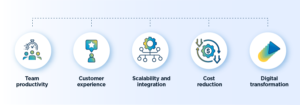In the last decade, the workplace has experienced one of its most significant transformations yet — the rise of AI automation. Businesses across industries are no longer just experimenting with artificial intelligence; they are integrating it into their daily operations, redefining efficiency, productivity, and the very nature of work itself.
What Is AI Automation?
AI automation is the application of artificial intelligence technologies to perform tasks that previously required human effort. These tasks can range from simple, repetitive processes—like data entry or invoice processing—to more complex functions, such as predictive analytics, decision-making, and customer service automation. Unlike traditional automation, AI-driven systems can learn, adapt, and optimize themselves over time, making them far more intelligent, flexible, and capable of handling dynamic business environments.

Streamlining Operations
One of the most profound impacts of AI automation is its ability to streamline operations. By taking over routine and repetitive tasks, businesses can minimize errors, save valuable time, and redirect human talent toward more strategic and creative initiatives. Some examples include:
-
Manufacturing: AI-powered robots manage repetitive assembly line tasks, boosting production speed while maintaining high-quality standards.
-
Finance: Intelligent algorithms can process thousands of transactions in seconds, detect anomalies, and even identify potential fraud.
-
Customer Service: Chatbots and virtual assistants handle routine inquiries, freeing human agents to focus on more complex and nuanced customer needs.
Enhancing Decision-Making
AI automation is transforming decision-making in modern businesses. With access to vast amounts of data, AI systems can identify patterns, forecast trends, and deliver actionable insights that humans could not analyze as quickly. This empowers companies to make smarter, data-driven decisions—whether in inventory management, marketing strategies, or operational planning.

Boosting Productivity and Employee Satisfaction
![]()
Contrary to popular fears, AI automation doesn’t replace humans—it amplifies their capabilities. By handling repetitive, mundane tasks, AI allows employees to focus on creative problem-solving, strategic thinking, and innovation. This not only enhances productivity but also increases employee satisfaction and engagement, as workers can contribute in more meaningful and impactful ways.
Challenges and Considerations

Despite its advantages, AI automation presents challenges. Businesses must address ethical concerns, protect data privacy, and offer upskilling opportunities for employees whose roles are evolving. Furthermore, implementing AI systems requires careful planning and investment to ensure smooth integration into existing workflows.
The Future of Work
AI automation is not a passing trend; it is a driving force for a new era of work. As technology advances, companies that adopt AI strategically will gain a competitive edge through higher efficiency, smarter decisions, and more innovative solutions. The future workplace will be a collaboration between humans and AI, with machines handling repetitive tasks while humans focus on creativity, empathy, and strategy.